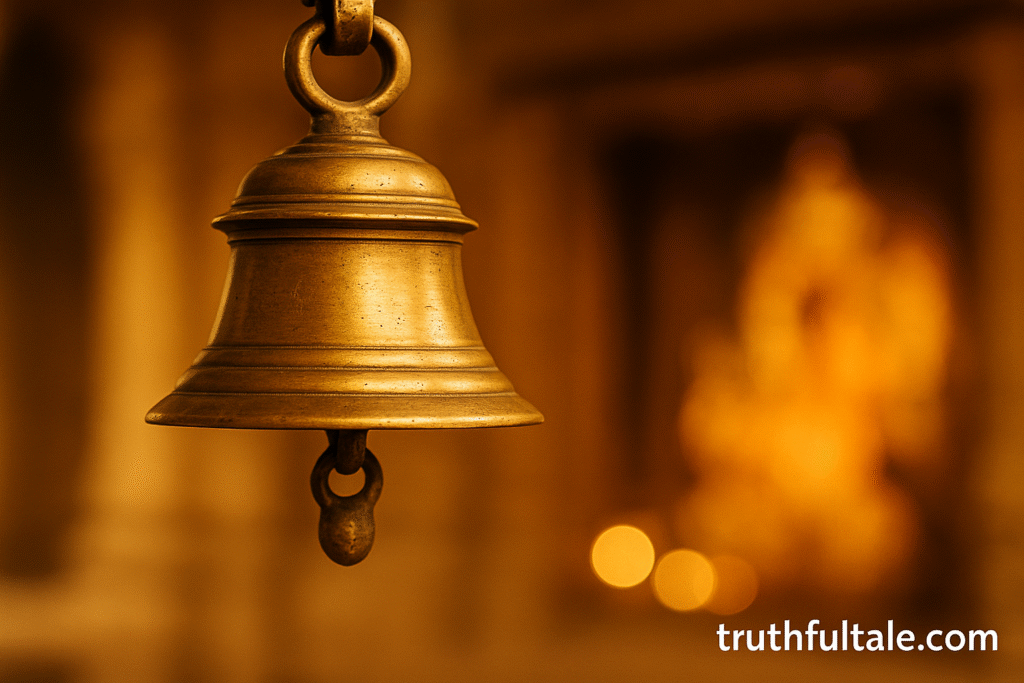"Why We Ring the Bell Before Puja"
In Hindu temples and home shrines, you might have noticed a bell (Ghanti) hanging near the entrance or placed beside the deity. Before starting the worship, devotees gently ring the bell. This act is not just a tradition—it holds deep spiritual, scientific, and cultural meaning.

Historical & Mythological Background
The tradition of ringing bells dates back thousands of years.
In Vedic times, the bell was considered an invitation for divine energy. The sound “Om” is said to be the cosmic vibration, and the ringing of a bell creates a similar continuous vibration that purifies the surroundings.
Mythological Reference:
There is a belief that during Samudra Manthan (Churning of the Ocean), the gods used celestial sounds to ward off negative energies. The bell, in a symbolic form, carries that legacy—it drives away evil and invites positivity.
In many Shiva temples, the bell’s sound is believed to awaken the sleeping energy of the deity, signaling the start of worship. In Vishnu temples, it is said to please the divine and make the devotee’s presence known to the Lord.
Significance of Ringing the Bell
Apart from its spiritual meaning, ringing a bell also has scientific benefits:
- Sound Waves Clear the Mind – The sharp yet pleasant sound activates the brain’s left and right hemispheres, leading to better concentration.
- Antibacterial Properties – Traditional temple bells are made of metals like copper, bronze, and silver. These metals produce sound waves that kill harmful germs in the air.
- Improved Hearing & Mental Alertness – The sound frequency (usually 540–600 Hz) stimulates the ear nerves and brain.
Benefits of Ringing the Bell During Puja
1. Brings mental calmness and focus.
2. Wards off negative energy from the surroundings.
3. Connects the devotee emotionally to the ritual.
4. Enhances the positive vibration of the prayer space.
5. Helps children develop interest and discipline in puja rituals.
Can Ladies Ring the Bell During Pooja?
There is no scriptural restriction in the Vedas or Puranas that says women cannot ring the bell. In fact, the sound of the bell is considered gender-neutral—its purpose is to invite divine energy.
However, in some traditional households or temples, women are asked not to ring the bell during menstruation due to ritual purity beliefs. This is based on cultural customs, not direct divine instruction.
In modern times, many spiritual teachers emphasize that devotion matters more than restrictions. If the heart is pure, anyone—man, woman, or child—can ring the bell.
A Small Story – The Bell That Saved the Village
Once, in a small village, there was a temple with a big bronze bell. One night, a group of wild animals entered the village. The frightened priest ran to the temple and began ringing the bell continuously, calling for divine help. The loud, deep sound scared the animals away.
The villagers believed that it was not only the sound but also the divine energy invoked by the bell that saved them. Since then, the bell became a symbol of protection for the village.
Conclusion
Ringing the bell during puja is more than just a sound—it is a spiritual announcement that the devotee is present before the divine. It cleanses the mind, purifies the environment, and strengthens the connection between God and devotee.
Whether in a grand temple or a small home shrine, the humble bell carries centuries of faith, science, and tradition in its chime.
